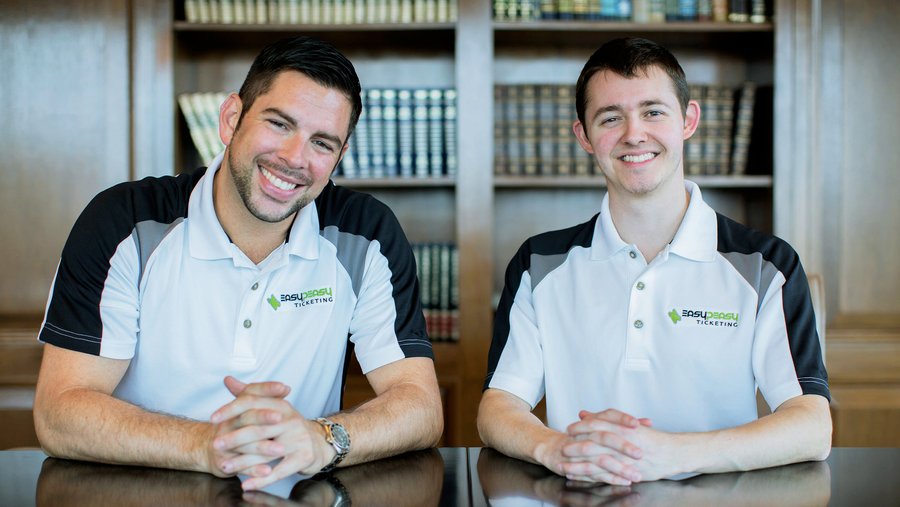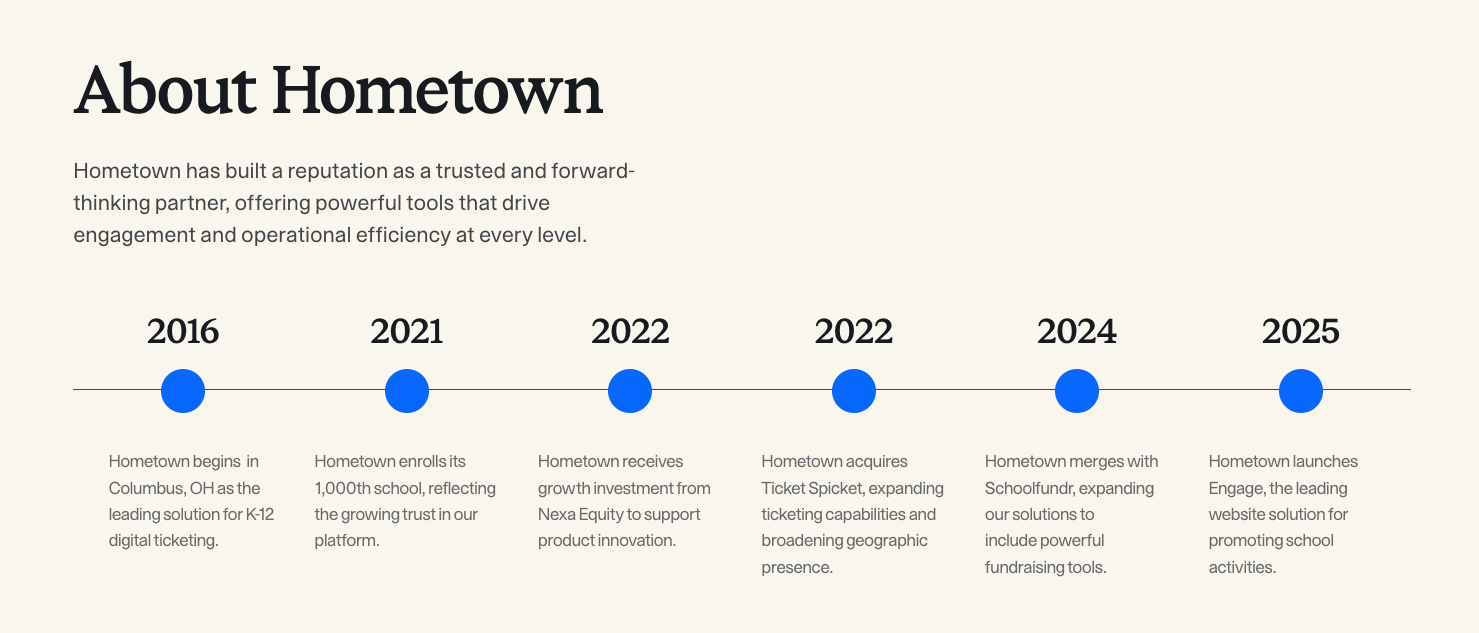Every great company has an origin story, and ours is no different. But unlike the polished tales you sometimes read in business magazines, the history of Hometown is one of trial-and-error, long nights, grit, and a few good laughs along the way.
It all started in Columbus, Ohio. Not in a boardroom, but in the kinds of places where most people go to relax: small venues and local theaters. At the time, most digital ticketing platforms were designed primarily for larger venues. They were expensive, clunky, and came with steep fees that often matched (or even outweighed) the price of the ticket itself.
Wesley Haines, one of our co-founders, remembers it vividly. In sharing his story with us, Wesley reflected on a time when he’d tried to buy a $15 ticket for a concert, only to be hit with a $13 service fee. As a broke college student, he and his friend were so frustrated that they decided not to go at all. That moment planted the seed for an idea: ticketing could, and should, be better.
The First Experiment: Easy Peasy Ticketing
When Wesley reconnected with fellow co-founder Nate Nale, the two decided to take on the challenge. Together, they built a platform they initially called Easy Peasy Ticketing. The focus at the time wasn’t schools, though; it was those small venues and theatres around Columbus.
Their first “big test” was a New Year’s Eve event downtown. Equipped with nothing more than some grocery store-style barcode scanners and a suboptimal payment processor (in Wesley’s words, it was “god-awful,”) they made it work. It wasn’t pretty, but it proved there was something there.

A few months later, the team made their first hire: Oscar Rubio, a talented developer Wesley had worked with at Ohio State. Fresh out of college, Oscar took a leap of faith, joining a three-person start-up with more grit than guarantees. It was a bold move that paid off. Today, Oscar is still with Hometown, now serving as a Lead Software Engineer and continuing to help shape the platform’s future.
“Working with Wes and having a direct impact on the project was exactly what I wanted to do. I wanted to be able to look at the product in the wild and say that I played a major role in it. Everyone wants to love the work they are doing, and helping start [Hometown] was one of the best experiences I have ever had,” said Rubio.
A Pivotal Shift: Schools Come Calling
The turning point came when the team was introduced to a local high school district, Pickerington Schools. They were looking for a better ticketing solution, and while Hometown (still Easy Peasy at the time) hadn’t set out to serve schools, the timing was perfect.
The demo could have gone sideways from the start. Wesley still looked young enough that when he walked into the school office, the secretary thought he was there to register as a new student. But once the laughter passed, the real meeting began, and that’s where things changed forever.
The district treasurer and theater director were impressed. They had been asking their previous provider for specific features, like seat maps, for years without success. Hometown’s small but nimble team was able to build those capabilities within a weekend. When the school gave Wes and his team an ultimatum — “if you can have this built by next week, we’ll go with you” — the founders pulled an all-nighter and delivered.
At that moment, standing in the parking lot after the demo, Nate and Wesley knew: this was the future. Schools were underserved. They needed solutions that were professional, affordable, and built with their unique challenges in mind. And just like that, Hometown had found its home.
“We walked out of that school demo, fist-bumped in the parking lot, and said: ‘This is it. This is where we belong.”
– Wesley Haines
Co-Founder, Hometown
Learning and Growing Alongside Schools
Those early days were full of hustle, grit, and learning. For a long time, every school had its own custom box office built from scratch. It wasn’t the most scalable approach, but it helped the founders understand what schools really needed. Pickerington became not just a customer, but a partner in shaping what the platform could be. Helping highlight the unique needs and challenges schools and districts face.
“At Pickerington Central we really enjoy working with Hometown as our online ticketing system. The entire operation is first class, and the support that your reps give us is tremendous,” said Lisa Morelli, Athletic Director at Pinkerington Central High School. “Hometown also has given us game day event help when we were 30 minutes from opening our gates at a large varsity football game.”
“If any school district or athletic director ever asks me my opinion on online ticketing, I definitely tell them hands down that Hometown is the best.”
– Lisa Morelli
Athletic Director, Pickerington Central HS/Ridgeview JHS
Some of the early problems Hometown uncovered were bigger than ticket sales. School districts were handling tens of thousands of dollars in cash at events, sometimes carried around in literal lockboxes. Money was disappearing, reporting was nearly impossible, and treasurers were spending hours every week chasing down transactions.
Hometown’s digital-first approach didn’t just streamline event operations, it made schools safer and more financially secure.
The COVID Catalyst
By the end of 2019, Hometown had just over 100 school customers. Growth was steady, but no one could have predicted the effects COVID-19 would have.
In-person events shut down everywhere. For schools, it was a moment of crisis, but also a turning point. Suddenly, digital solutions weren’t optional anymore. Cashless payments, capacity management, and contactless ticket scanning became essential overnight.
Hometown was ready. The platform already had the tools schools needed, and demand exploded. By the end of 2020, the company had grown to serve thousands of schools, cementing its role as the leading digital ticketing provider for K–12.
The team had to scale just as quickly as the business. Within a week, a brand-new customer support team was hired and trained, with many of those original hires still at Hometown today. Stories of dedication and customer support were everywhere: employees driving out to rural schools to make sure events went smoothly, staying late to set up last-minute box offices, or answering calls long after hours when other ticketing providers had turned off their phones and gone silent.
One school administrator summed it up perfectly to Wes: while other companies’ phones rang unanswered, Hometown picked up. That difference mattered. And it still matters today.
From Start-Up to Industry Leader
As the company continued to grow, Hometown began investing in its future. In 2022, a funding round with Nexa Equity fueled expansion, technology upgrades, and acquisitions that broadened the platform’s capabilities. And the merger with Schoolfundr allowed Hometown to incorporate robust fee-free online fundraising into its suite of solutions.
What started as a scrappy side project for small venues in Columbus had evolved into a national leader serving thousands of schools and communities across the country.

Along the way, Hometown’s mission remained the same: empower schools and organizations to create better experiences, eliminate unnecessary fees, and keep more money where it belongs, supporting students, programs, and communities.
Still Connected to Our Roots
Looking back, Wesley reflects on those early days with a mix of pride and gratitude. From the New Year’s Eve party that taught the team what not to do, to the Pickerington demo that changed everything, to the all-hands-on-deck mentality of 2020, Hometown’s story is one of resilience, partnership, and purpose.
And while so much has changed, the scale, the reach, the technology – some things haven’t. Pickerington, that very first school customer, is still with us today. Oscar, the first hire, is still writing code. And the same scrappy spirit that fueled those early late-night builds is alive and well in the team today.
Because at the end of the day, Hometown was never just about tickets. It was, and always will be, about people, students, educators, families, and communities coming together to support what they love. And that’s a story worth telling.
.jpg)
Looking Ahead
Today, Hometown is more than the digital ticketing solution we started with. We’ve grown into a platform that brings schools, students, and communities together through ticketing, websites, and fundraising. The future of Hometown isn’t just about technology; it’s about people, moments, and the lasting impact they create.
“Our mission is simple and deeply rooted: to empower schools to build stronger communities and deliver better experiences beyond the classroom.”
– Dennis Levene, CEO
Hometown




.png)




